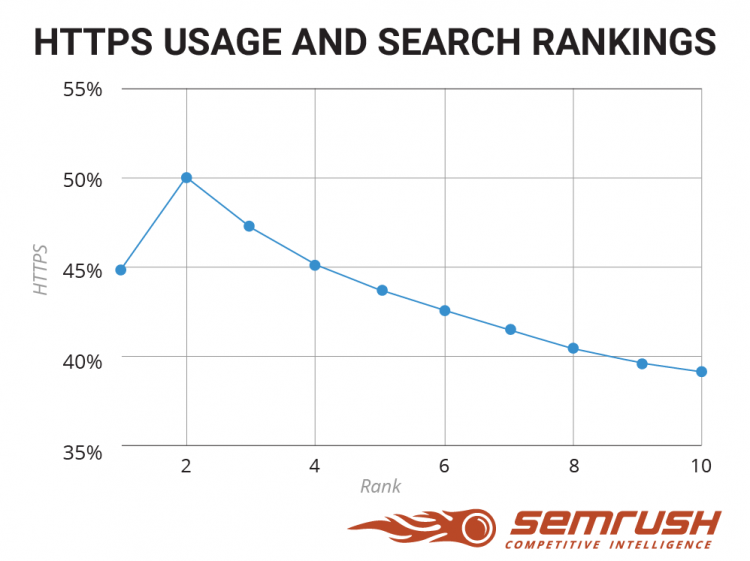
It’s been about two months since we launched free SSL integration for Carrot customers. As of this article’s creation, 2,327 Carrot websites have made the switch from HTTP to HTTPS. And here’s what some of them are saying.
“Setting up SSL was so easy. I have been waiting for this and I am glad you all implemented this in such a simple way!” — Lamar Cannon from Lamar Buys Houses
“Although a boring update for most, I’m glad to see this added. Also, bravo on the execution. Easy to use, and rolling it into existing offering was way to go versus having us mess with renewals and certificates. Appreciate the hard work and continued improvement!” — Tyler Weinrich from Tyler Buys Houses
“Thank you! Implementing SSL properly can be difficult and I’m impressed by how easy you guys have made it on us users. Everything worked perfectly per the instructions.” — Jeffrey Miller from AE Home Group
We’ve seen lots of websites increase in ranking already (it could be a coincidence in the timing or a small part could be SSL… too soon to tell) and those clients are already seeing the other benefits of SSL.
But we’ve heard from some members that after making their site SSL they experienced a drop in Google rankings… so we’ve created this post to address that concern and to walk you through things you can do if you experienced a drop… and to dive into the reasons a site could drop after adding SSL.
If you did, don’t worry — that dip is actually quite common and almost always temporary. Here’s what you need to know.
“Why did my Rankings Decrease after Integrating SSL?”
Unfortunately, it’s hard to know the exact reason(s) that your ranking fell.
It’s possible, for instance, that you noticed a dip in your rankings after integrating SSL and yet, the dip had nothing to do with the transition. From on-page SEO to SERP competition to backlinks, the world of SEO is complicated and discovering the reason for a sliding website isn’t a simple matter.
Still, it is possible that SSL made your website slide a bit. So now let’s deal with the follow-up question: “Why the heck would you recommend that I integrate SSL if it’s going to hurt my rankings?”
The answer to that question is this: because while SSL might dip your rankings in the short run, it will secure or even increase your rankings in the long run.
Here’s what Google has to say about this:
“Expect temporary fluctuation in site ranking during the move. With any significant change to a site, you may experience ranking fluctuations while Google recrawls and reindexes your site. As a general rule, a medium-sized website can take a few weeks for most pages to move in our index; larger sites can take longer. The speed at which Googlebot and our systems discover and process moved URLs largely depends on the number of URLs and your server speed. Submitting a sitemap can help make the discovery process quicker, and it’s fine to move your site in sections.”
In simpler terms, this means that if your decrease in rankings was caused by SSL integration (which it might not have been), then it will most likely be temporary until Google has a chance to index all of your new pages.
Think about it this way. When your website moves from HTTP to HTTPS, in Google’s eyes, all of those HTTPS pages of your website aren’t the same pages at the HTTP version, but duplicates. With SSL integration, then, all of those HTTP pages redirect to HTTPS pages. And Google takes time to register and index all of those redirects.
Here’s what Rand Fishkin, the founder of Moz, has to say in one forum:
“You can see many folks chimed in (both on G+ and on Twitter) noting that they’d had similar experiences. HTTPS is like any other redirection – it takes time for Google to pick up and count all the redirects, and in the meantime, you can lose rankings/traffic. We found that it all came back within ~3 months.”

Said another way, a slight and temporary dip in rankings after SSL integration isn’t out of the ordinary.
How to Speed Up Google’s Re-indexing Process
Still, there are a few things you can do to speed up the recovery process and help Google re-index your website faster than they might on their own.
- Update your Google Search Console URL – Since Google sees your HTTPS pages as a new domain, you should definitely take a minute to go change your URL in the Google Search Console. You can learn how to do that here.
- Change old backlinks to the new HTTPS URL — If your backlinks profile is weak, you could lose up to 10% of the “link juice” from a given backlink because of the redirect from HTTP to HTTPS. If your backlink profile was weak, this alone could be enough to see a dip in rankings. After the change, most backlinks will point to your HTTP pages, but, ideally, you want them to point to your new HTTPS pages. For obvious reasons, fixing those backlinks can be a tedious process. Do what you can here, but don’t sweat it if you can’t get some of them changed.
- Build new backlinks these next 2 months to your HTTPS URL — You’ll get the most SEO benefit from backlinks that point to your SSL certified URL, so make sure that any backlinks you get in the future have HTTPS in the URL (just copy and paste the URL from your website).
- Point internal links toward the HTTPS URL — Similar to what you’re doing with old backlinks, make sure that all of your internal links between pages point to HTTPS versions of the page rather than HTTP versions.
Ultimately, SSL integration is a big positive over the long term, but don’t be surprised if you see a slight decrease in your rankings over the next couple months. In the meantime, take the above four actions and Google should correct itself — eventually giving you back your original rankings and maybe even increasing your rankings.
Why Making the Change from HTTP to HTTPS is Still a Good Idea
For Carrot customers, we’ve made switching to SSL as easy as clicking a few buttons. You can learn exactly how to do it here.
Maybe you’re not convinced, though. Maybe you’re still wondering why you should make the change from HTTP to HTTPS. After all, your current website is pulling leads and driving traffic. Why rock the boat?
Well, there are a few reasons that we want to encourage you to add SSL to your website if you haven’t already — even if your website is already performing like you want it to.
First of all, websites that have SSL certification tend to rank better than websites that don’t.

This, of course, can take some time to actually have an impact on your rankings, but adding SSL to your website is a long-term play. It might not increase your SEO right away, but it prepares you for a future where search engines will increasingly favor HTTPS URLs.
In the words of Google, “We encourage you to adopt HTTPS in order to protect your users’ connections to your website, regardless of the content on the site.”
Google even uses SSL integration as a minor ranking signal when choosing which websites to list and which to leave unseen.
Of course, SEO isn’t the only benefit to SSL integration. The most obvious advantage is website security…
“SSL exists to make the connection between you and a website private. Without this, the data you send over the network could potentially be spied on by someone else on your network. This is something web visitors, your web browser, and even Google are looking for more and more and we wanted to get you ahead of the curve.” — Carrot’s CTO, Chris Carr
And even website load speed is a consideration…
“SSL creates a different type of connection on the web that allows for some new technology that can speed up page loading. Future proofing Carrot websites and allowing for more performance in the browser is always a win for us on the tech team. This equals less work, less expense, less hassle, and increased performance for you. Oh, and all of that means peace of mind.” — Carrot’s CTO, Chris Carr
In the end, the long-term benefits of SSL integration outweigh the possible short-term dip in your rankings. If you’re not a Carrot customer, then you might experience a decrease in your SEO after transitioning for one of these reasons:
- You didn’t install the certificate properly.
- You didn’t properly implement redirects to your new HTTPS pages.
- You have canonical tags on HTTP page versions.
- You’re using a bad SSL certificate.
Fortunately, if you’re a Carrot customer, you don’t have to worry about any of those things. We take care of all of that for you :-)
Conclusion
If you’ve integrated SSL and you’re loving it, awesome. :-)
If you’ve integrated SSL and you saw a dip in your rankings, take heart — this is normal and the dip should be temporary. Sometimes, Google just takes a bit of time to re-index your website. And you can do the four things mentioned in this article to speed that process up.
And if you haven’t integrated SSL on your website yet, then we recommend you do so. In the long run, it will help your website’s rankings, it will increase your security, and it will even make your website faster.
As always, though, if you have any questions, don’t hesitate to leave a comment on this post or contact our world-class Customer Success team.

